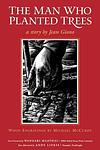Jean Giono
Jean Giono was a French author renowned for his works of fiction set in the Provence region of France, which often celebrate nature and the land. Born on March 30, 1895, in Manosque, Alpes-de-Haute-Provence, he was a self-taught writer who drew inspiration from his experiences in World War I. Giono's literature is characterized by a deep love for the natural world and a strong pacifist stance. His notable works include 'The Man Who Planted Trees,' 'Blue Boy (Jean le Bleu),' and 'Harvest (Regain).' He passed away on October 9, 1970.
Books
This list of books are ONLY the books that have been ranked on the lists that are aggregated on this site. This is not a comprehensive list of all books by this author.
-
1. The Horseman on the Roof
"The Horseman on the Roof" is a historical novel set in 19th century France during a cholera epidemic. The story revolves around an Italian nobleman who is a member of a secret revolutionary group. He is forced to flee his homeland due to political turmoil and ends up in Provence, where he encounters and falls in love with a beautiful woman. As he travels through the plague-ridden countryside, he faces various trials and struggles, reflecting on the nature of honor, duty, and love.
-
2. The Song Of The World
This novel is a lyrical exploration of the natural world and human emotions, set in the rugged landscape of the French Alps. It tells the story of a young man's journey through this majestic terrain, where he encounters love, friendship, and the raw forces of nature. The narrative is deeply imbued with poetic descriptions of the countryside and philosophical reflections on humanity's place within the natural world. Through its vivid portrayal of the characters' lives and the environment that shapes them, the book celebrates the profound connection between humans and the earth, offering a powerful message about the importance of living in harmony with the natural world.
-
3. The Man Who Planted Trees
The book tells the inspiring tale of a solitary shepherd who, through his unwavering commitment to reforest a desolate valley in the foothills of the Alps in Provence throughout the first half of the 20th century, transforms the landscape and, in turn, the lives of the people who come to inhabit the region. With great patience and persistence, he plants one hundred acorns a day for over thirty years, ultimately creating a lush forest that revitalizes the land and offers a powerful testament to the impact one person's efforts can have on the world around them.
-
4. A King Alone
The novel is a haunting tale set in a remote alpine village, where the inhabitants are plagued by a series of mysterious disappearances amidst a harsh and unforgiving winter landscape. The narrative follows a methodical and solitary police commissioner as he arrives to investigate the unsettling events. His presence and probing inquiries unsettle the villagers as he delves deeper into the enigma, uncovering the complex web of human relationships and the psychological undercurrents that define the isolated community. The story is a blend of detective fiction and existential meditation, exploring themes of loneliness, the human condition, and the inscrutable nature of existence against the backdrop of the natural world's indifferent beauty and brutality.



